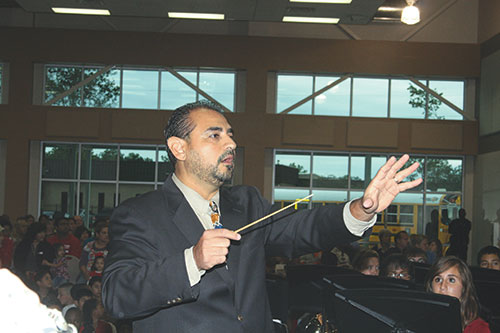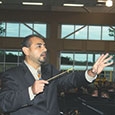
In November 2010, we chatted with Spring (Texas) High School Director of Bands Gabe Musella. We recently caught up with him to ask how his teaching has changed in the last seven years.
How would you say the way you teach changed in the last seven years?
In Texas we have to be trained in CPR to teach marching band. I was never more glad for that training than in 2013, when my father had a heart attack in front of me and my family on Thanksgiving Day, and I had to use CPR to save him. Since this happened, my band has taken off, and I liken it to putting everything in perspective. Teaching and shaping young people is important, but at the end of the day it’s not life or death, and I think that perspective has made me a better teacher. I feel less pressure about our performances, and this makes students feel the same.
Are there any new ideas you’ve incorporated into your teaching?
After our saxophone quartet played at the Midwest Clinic in 2013 we increased the emphasis on chamber music to the point where we have year-round chamber ensembles. After watching the quartet’s spectacular concert, I remember thinking there was no need to worry about what I programmed in the spring; my saxophonists were going to play anything I put in front of them. Wouldn’t it be cool if I felt that way about every section?
Assistant director Jason Smith, who coached the quartet, now runs our chamber program, and he has had a lot of success. There is a competition in Austin called the Coltman Chamber Compe-tition, and Jason has gotten a woodwind quintet, sax quartet, and clarinet quartet into the finals, plus additional groups accepted. Some of our groups now meet all year and rehearse by themselves quite well. We have three or four bands depending on enrollment, and all of the ensembles come from the same band. I usually assign them after our June marching camp, but in the last couple years students have begun forming groups on their own, which is gratifying to see.
Gary Lewis from the University of Colorado has worked with our band. He notes that within any given piece there are moments of chamber music, and the more we get the performers to realize who they are playing with and what their role is in that small ensemble, the better the piece sounds.
Are there any aspects of musicianship that you plan to focus on this coming school year?
There is always a quest for students owning musical decisions. I am always trying to find music that will let some of my soloists shine. I frequently tell the group that everyone is a soloist. In our daily drill, we use an exercise where somebody at some point will get a chance to play a three-note phrase, which the entire ensemble has to mimic. We call it an Inverted Remington. It is two half notes and a whole note (F-E-F), and the lead student can shape that anyway he wants – crescendo through two notes, decrescendo through all three notes, or play the whole thing pianissimo. We frequently discuss communicating intent to the audience. If you communicate a pianissimo properly then the ensemble will get it, and if not, that’s a learning opportunity. Students always enjoy that drill, and it builds confidence in playing alone, and they have the freedom to shape and articulate those three notes any way they like. Sometimes no one conducts it, and occasionally I turn off the lights and we play it in the dark.
What are some of your other favorite daily drill exercises?
Well my favorite is an interval exercise I got from Tom Bennett. The band is split into two groups that alternate when they play roots and fifths. In the beginning stages all we do is lock in that fifth, but then the exercise gets more complicated.
The aim of this exercise is to make it impossible to tell when the two groups switch notes; we do not want to hear a rearticulation of the C. This is difficult to accomplish, but it sharpens the ears immensely and works wonders for balance and fitting into your neighbor’s sound.
After the fifth, we play the tri-tone, then perfect fourth, major third, and all the way down to the unison. Sometimes I continue all the way down to a perfect fifth below the F. It takes several minutes to go through this full range, but the time spent is worth it. Other times we go up to the major sixth. I have not been bold enough to try the octave yet.
Occasionally we send groups off in trios to master just a couple of intervals. I might say, “Go off to a corner somewhere and work this exercise for five minutes. It is a chaotic sound, but when we come back to the ensemble, it is amazing how much more resonant everything is.
In 2010, you mentioned that one of the keys to a good performance was giving students the correct information on their instruments. Give an example on any instrument.
I was a tuba player, so I will use that instrument as an example. To make the low register speak correctly, tongue placement should be much lower than some players may think. In the extreme low registers the tongue has to go between the teeth, because there’s no other way to make that happen.
When considering a transcription to play, people immediately check high woodwind parts for technique, but the low string bass parts have to be covered by tuba players and lower reeds. Technical facility is important, but with transcriptions, it is also important for bass instruments to create the right sound. It takes a great deal of air to get a sound that matches a string bass, and it is important that students know what to aim for.
What is your best advice for a new teacher?
Seek out the information you need, and do not be afraid to call to an experienced older person. This will be my 30th year of teaching, and I would not have enjoyed any success if I hadn’t had access to so many wonderful mentors. I have a broad support network and am grateful to so many people for taking the time to give me some advice on this profession. I think too often we lose young teachers because they never pick up the phone. They graduate from college excited and ready to go, but they are afraid of looking dumb by asking for help.
Reach out and get a mentor or two – or ten. There is no way anyone could possibly know everything there is to know about this business. My initial reaction to your first question was to tell you I’m not as smart as I thought I was. The longer you teach, the more you realize there is no way to know it all. All teachers should accept that and seek out mentors. There are a lot of people who would be happy to help.





